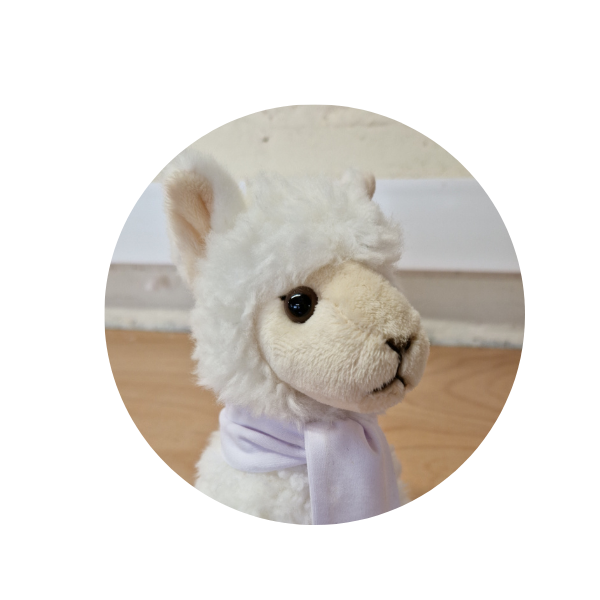
As many of you may know, we have a furry mascot for our Lean Library browser extension – isn’t he cute? The Lean Library Llama joins us at events and conferences, listening in as we talk to academic librarians from all over the world about Lean Library, the easy-to-use browser extension which simplifies online access to library content. We’ve named our Lean Library Llama Larry, but we’ve heard librarians and students name their llama all different names: from Allama Morisette to Louisa.
Do you want to find out where Larry the Llama has been this year and what he’s been up to? Read on to discover the travels of our four-legged friend…
Larry was lucky enough to travel to Austin, Texas for Electronic Resources and Libraries Conference (ER&L) 2023 back in March and had a great time on the stand chatting to librarians about their library.
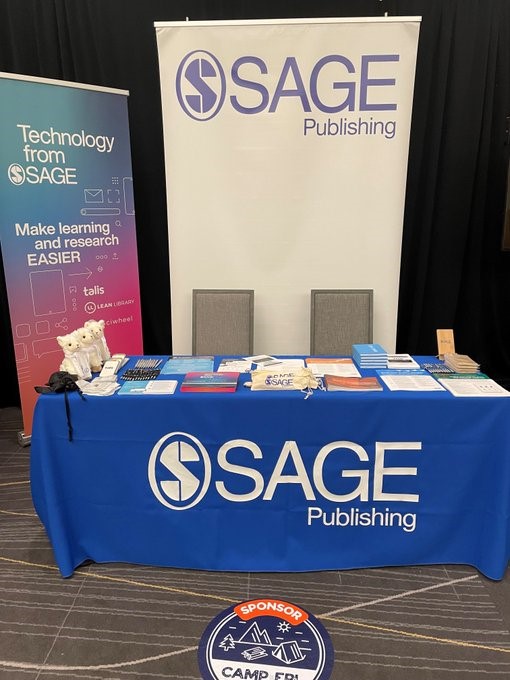
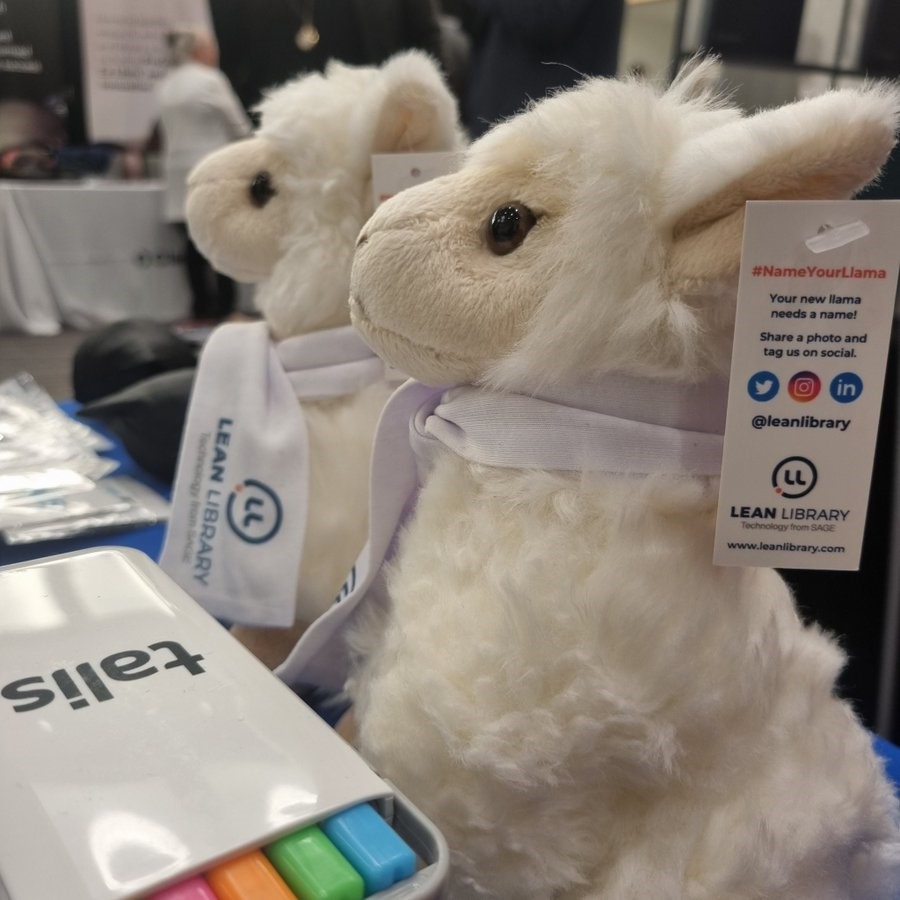
We were delighted to have three sessions at ER&L Conference 2023, ranging from future-proofing access to patron reference management.
Find out more about our sessions below:
In April, Larry and his friends joined us at our inaugural Tech from Sage Insight Conference in Birmingham at The REP Theatre. It was a jam-packed two days for academic librarians with workshops and presentations on Higher Education topics, ranging from the risks and opportunities of AI to rethinking the library of the future.
We ran a giveaway during the two-day conference for six librarians to win their own llama to take home. All they had to do was tweet about the conference using #TechfromSage. The lucky winners were Lowri, Jackie, Haylee, Hazel, Fiona and Chantal. We loved seeing the photos of the llamas from the winners:
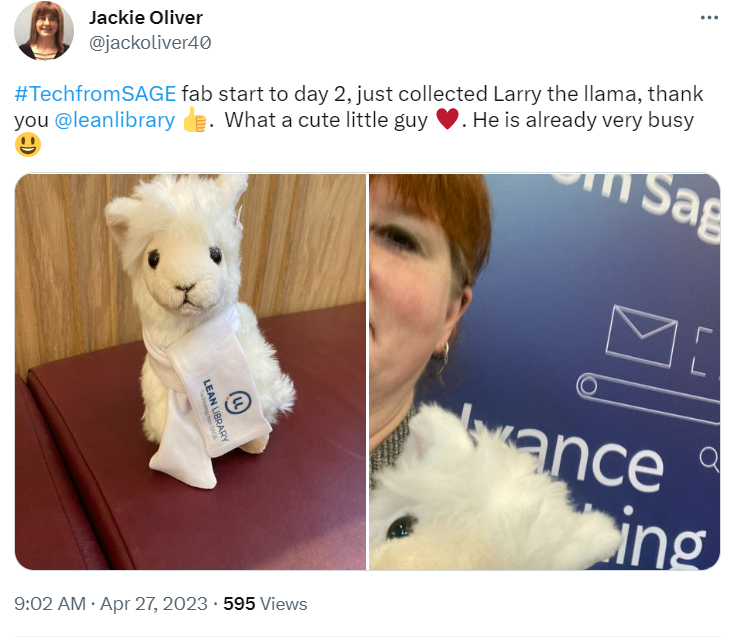
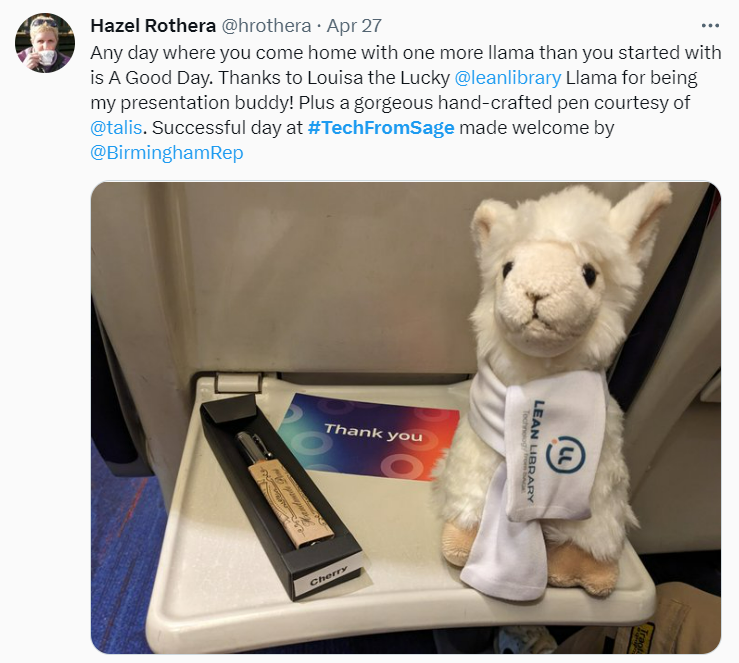
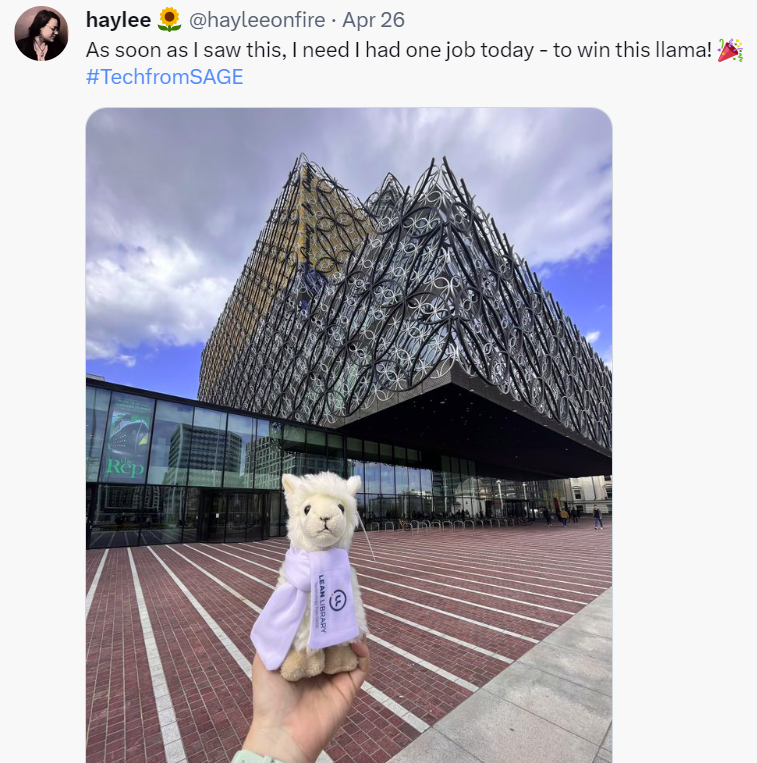
In May, Larry the Llama joined the Technology from Sage team at REBIUN Asamblea Conference in Alicante, Spain – a wonderful city for an academic conference and we loved meeting so many librarians from Spanish institutions.
Congratulations to Juana from Universisidad de Alicante who won a llama at the stand – we’re sure that this llama has gone to a fantastic home.
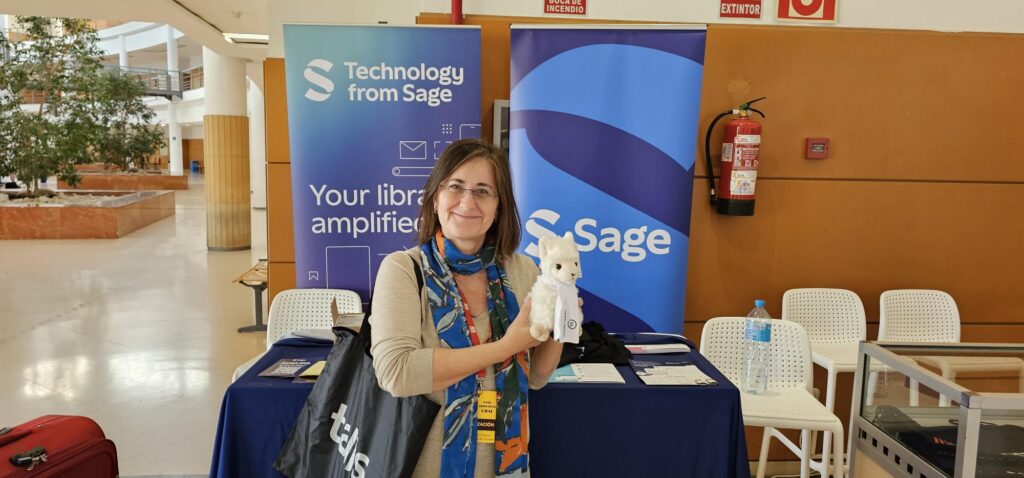
In September, Larry and his friends flew to Kennesaw in the United States (they’re becoming very well-travelled llamas) to promote the Lean Library browser extension at a usage driving event for students, run by Kennesaw State University Library.
We absolutely loved seeing the fantastic photos of the llamas enjoying a cold beverage and hanging out in the Lean Library branded paper bags. We felt it was a fantastic way for Kennesaw State University Library to celebrate that students now had access to Lean Library for their research.
Discover more about how Kennesaw State University Library have used Lean Library to increase their patron usage of digital collections in our case study.
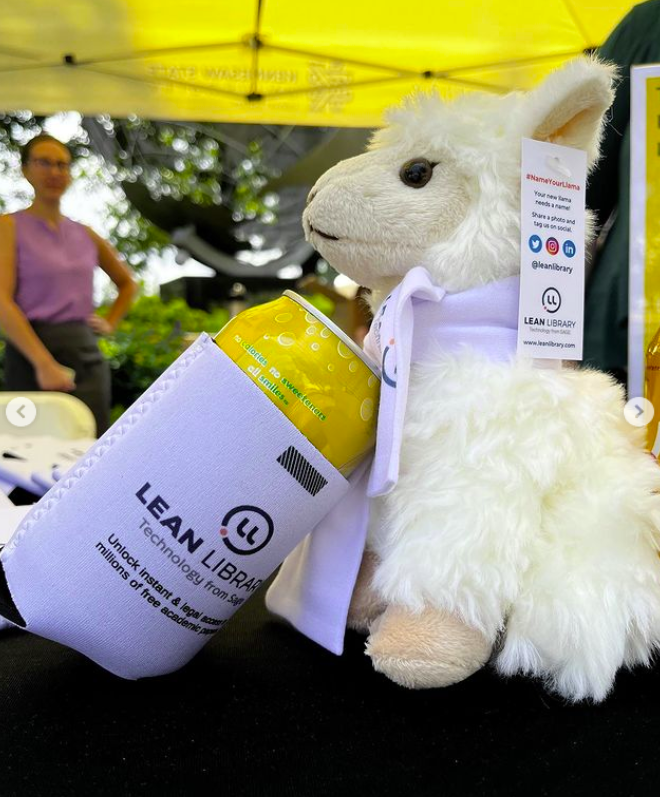
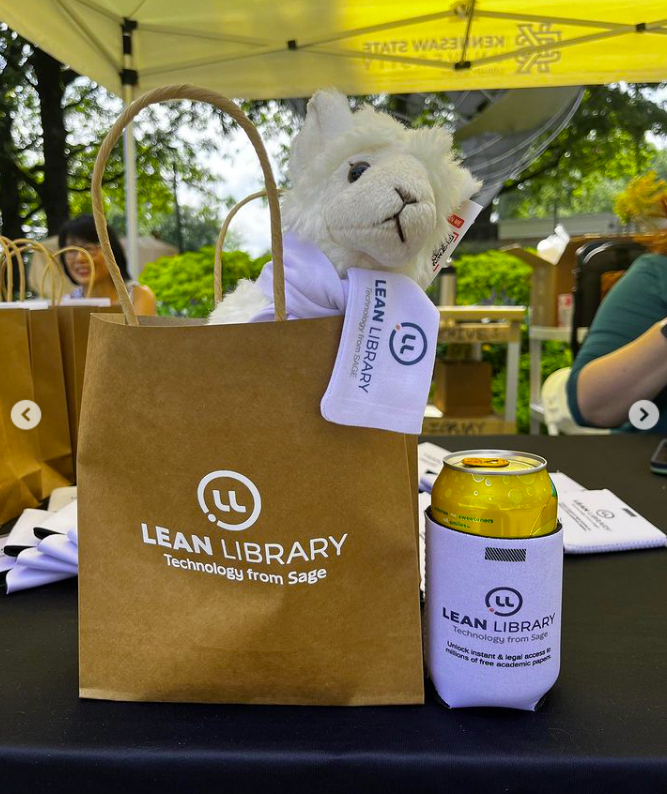
In November, Larry the Llama visited a couple of institutions within the United Kingdom. First stop, was University of Derby Library where three llamas were part of a competition for students to install the Lean Library browser extension and a gain a new study buddy at the same time. We absolutely loved that the three llamas who had found new homes were named Allama Morisette, Banana- Llama and Bubble.
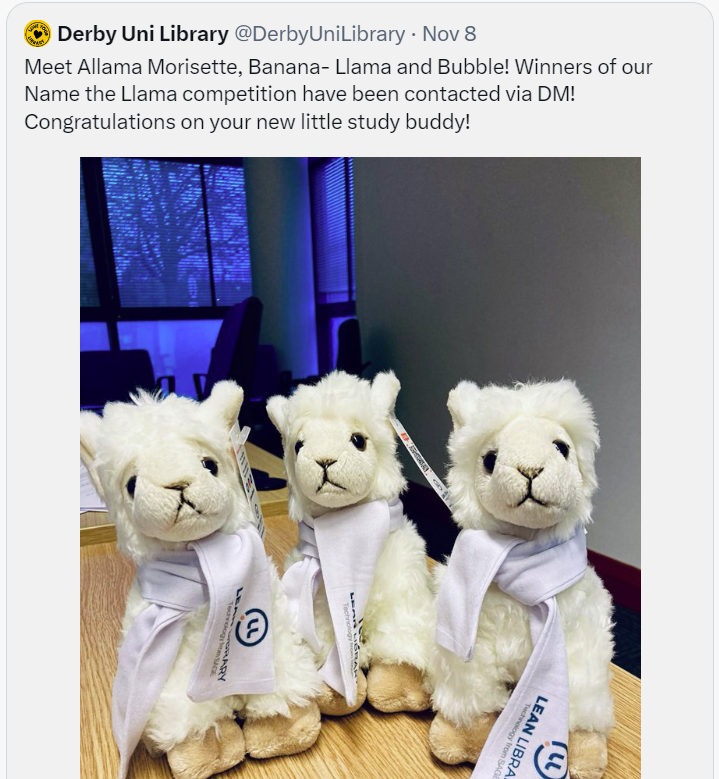
Larry and his friends travelled further up north to Lancaster, United Kingdom to visit University of Lancaster Library and meet some students. The llamas became part of the Lean Library Llama Digital and Usability Outreach Team and we’ve heard reports that they’ve been patrolling University of Lancaster Library to tell students about how Lean Library makes their research process even easier.
We loved the Lean Library tags on the llamas that the University of Lancaster librarians created!
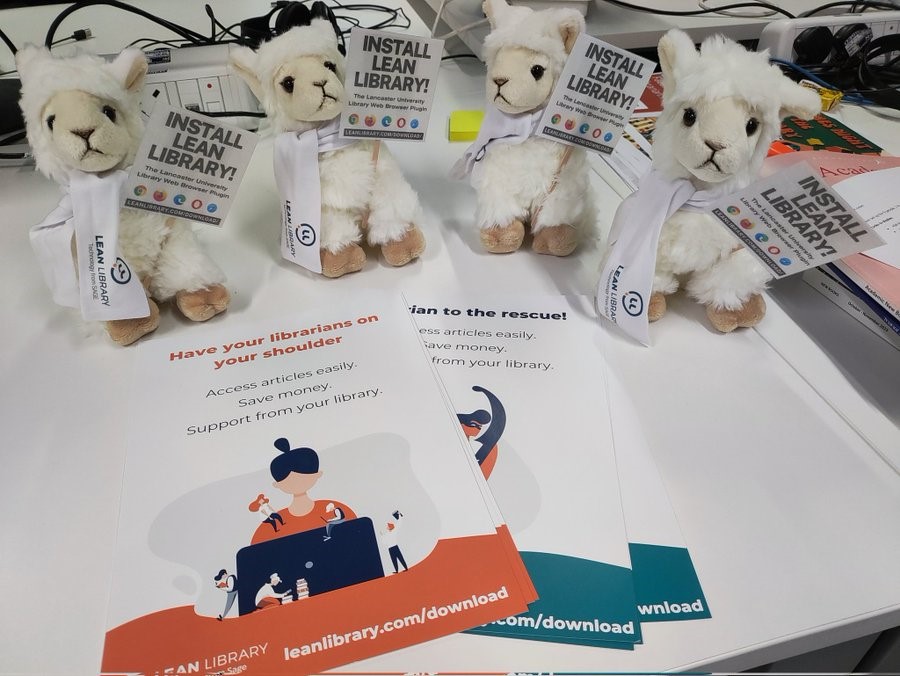
Larry the Llama visited Barbie Land in the summer to be Barbie’s loyal travel companion as she went to the Real World. This may have happened in Larry’s imagination, but we’ll leave that up to you to decide!

We hope 2024 brings even more travels for Larry the Lean Library Llama! Stay tuned for more adventures around conferences and institutions around the world.
Read our blog post to find out more about what Lean Library has been up to in 2023!
9 Key Findings from Librarian Futures Report Part Three November 9, 2023
We recently launched our Librarian Futures Part Three report, titled The Librarian Skills Gap. The report, in partnership with Skilltype, explores the emerging skills required to fulfil a library’s mission – in a decade shaped by social, political, and technological change – and meet the needs of today’s library patrons. We gathered global perspectives from over 2,000 academic library professionals, from frontline librarians to library directors, to ensure a representative set of insights for the report.
Our second Librarian Futures report asked the question: How can academic libraries be more deeply involved in the undergraduate learning journey? The new report investigates the new skills, competencies and responsibilities which librarians will develop in the years ahead and are going to be pivotal to this. We hope this report inspires conversations in your library, amongst your peers, and within the wider library community.
Here are the 9 key findings from Librarian Futures Report Part Three:
An overwhelming majority of librarians agreed or strongly agreed with the following statements:
Results were much more mixed for the statement “I feel confident regarding advancing my career”.
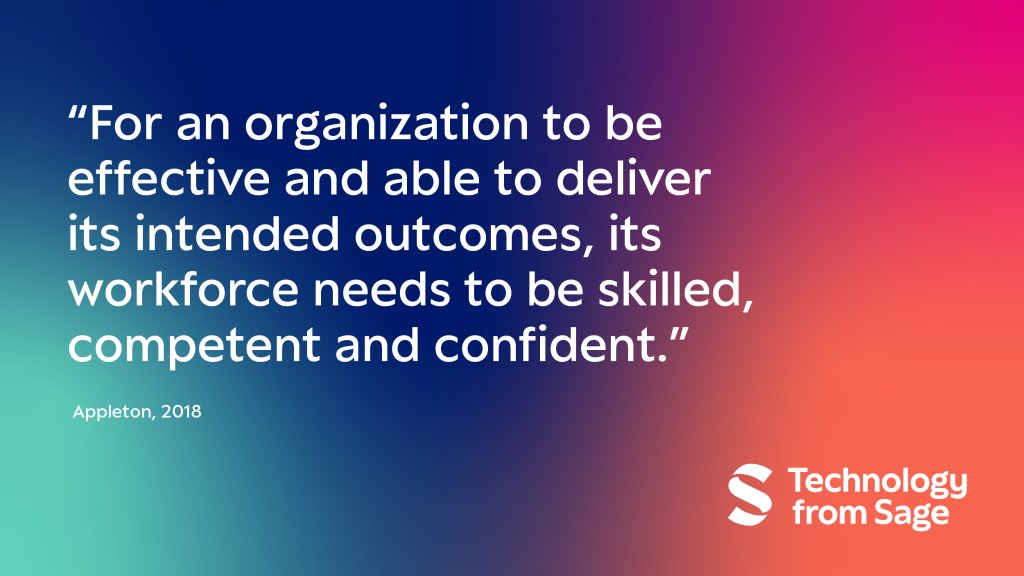
Although some are neutral on this question (17%), and a small number do not feel able to meet these challenges (8% disagree, 1% strongly disagree).
74% of respondents reported that they engaged in upskilling, on average, at least once every 3 months.
However, many librarians are being left out of such conversations, and the impact is particularly pronounced for staff without postgraduate qualifications and for staff working in a hybrid fashion and over 10% of library professionals surveyed as only upskilling once per year.
This is likely in response to the rapid rise of generative AI.
Moving into the medium and long term, a number of librarians see skills in learning analytics being crucial to develop.
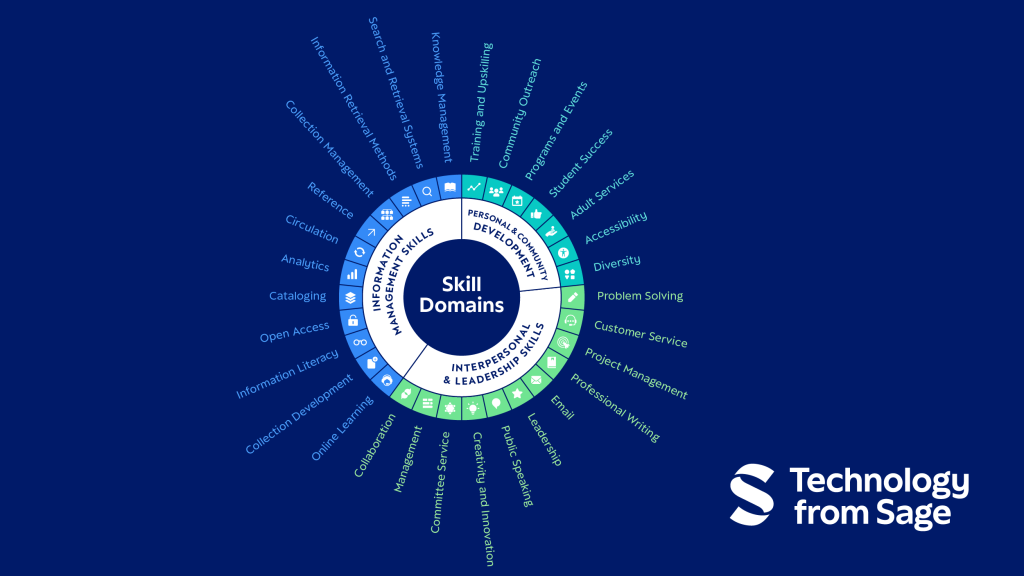
Over half of respondents agreed or strongly agreed that they were given ample opportunity to develop their skill set by the university (56%), and over half felt well supported to do so by senior management (62%), line managers (80%), and colleagues (72%).
Just 19% of respondents felt that students recognise their efforts to learn new skills. A plurality (41%) of librarians were neutral on the topic, while a relatively huge 40% of librarians actively disagreed with the statement.
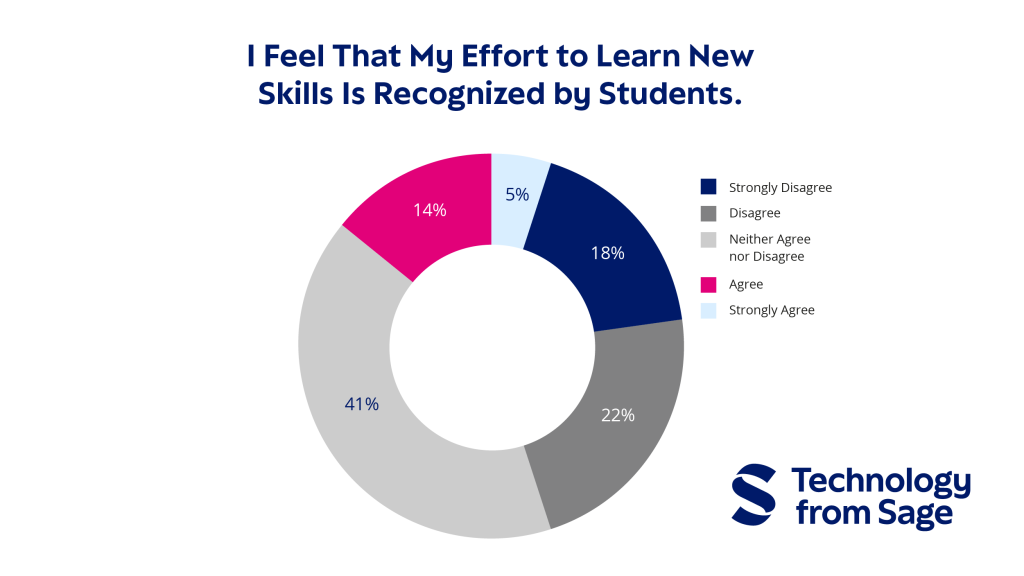
Approximately 75% of librarians have had the opportunity to engage in upskilling at least quarterly.
It is also worth noting that librarian training is coupled within travel budgets, which has increased the impact of COVID on librarian training budgets.
The next most popular choice was “other,” with respondents specifying their different ways of discovery. Some respondents described using online platforms such as Coursera or LinkedIn to discover new learning, while others spoke of having to undertake mandatory training.
Download our Librarian Futures Part III report to discover more noteworthy insights regarding the emerging skills required to fulfill a library’s mission and meet the needs of today’s library patrons.
Share your thoughts about the findings in the new Librarian Futures Part III report on Twitter and LinkedIn.
New Librarian Futures report sheds light on librarian perspectives on the current librarian skills landscape November 3, 2023
Based on Skilltype data and a Librarian Survey, the new Technology from Sage report explores the current librarian skills landscape and identifies areas for further development.
The second Librarian Futures report asked the question: How can academic libraries be more deeply involved in the undergraduate learning journey? This new report, in partnership with Skilltype, explores the emerging skills required to fulfil a library’s mission – in a decade shaped by social, political, and technological change – and meet the needs of today’s library patrons. We gathered global perspectives from over 2,000 academic library professionals, from frontline librarians to library directors, to ensure a representative set of insights for the report.
“Technology from Sage is proud to be a strategic investor in Skilltype, supporting their mission of building librarian skills for the future. I’m delighted that we could collaborate with Skilltype on this important report on librarian futures, helping Tony and his team share their unique insights on librarian skills – both where we are now, and what’s needed in the coming years.”
Matthew Hayes, PhD, MD, Technology from Sage
“Our aim with this collaboration is for information professionals and their teams gain new perspectives on the competencies they should be cultivating within their personal repertoires and their organizations. Librarians, and the new skills, competencies and responsibilities they will develop in the years ahead, are going to be pivotal to this. But it all starts with increased dialog, understanding where we are and where we want to go. I hope this report contributes to that dialog and inspires conversations in your library, amongst your peers, and within the wider library community.”
Tony Zanders, Founder and CEO, Skilltype
We believe the right technology can remove barriers to knowledge. So, we curated a suite of library technologies that improve your patrons’ workflow – from managing reading lists to discovering online resources and reference management. Whether used individually or in combination, our technologies amplify the library’s value on campus, prepare your library for the future, and are backed by the Sage name you already trust.
Find out more at: www.technologyfromsage.com
Skilltype is a talent management platform designed for libraries to analyze, develop, and share expertise. Founded in 2018, the platform uses linked data to help libraries identify skill gaps across their organization, create personalized training plans for employees, and identify opportunities for collaboration. Skilltype is based in Baton Rouge, Louisiana with offices in New Orleans and Boston.
Unlocking success: Start your new academic year with Lean Library October 6, 2023Throughout September we ran our Lean Library ‘Back to school’ webinar series, which consisted of three webinars, revisiting Lean Library’s key functionalities to ensure that our customers provide the best possible support to their patrons, and present our product roadmap for the year ahead. Let’s dive into the details of each webinar:
In our first webinar session, Senior Customer Success Consultant, Clare Chan, went over the key features of the Lean Library dashboard, providing the necessary tools for institutions to get the most out of this academic year. This session included:
In our second webinar session, Senior Customer Success Consultant, Clare Chan, was joined by Beatriu Piera Moreno, a Project Manager from the Autonomous University of Barcelona (UAB), who presented the results of AUB’s introduction of Lean Library, their strategy, and next steps, including:
In our third and last webinar session, Customer Success Consultant, Mariette Asem, was joined by Lean Library’s Senior Product Manager, Becca Richards, who looked back at Lean Library’s recent releases, upcoming updates to the product and what is being planned for Lean Library in 2024.
Read our latest case study from Kennesaw State University, who increased their collection usage by 3712% in just 4 months!
7 Ways to Reimagine the Academic Library September 26, 2023
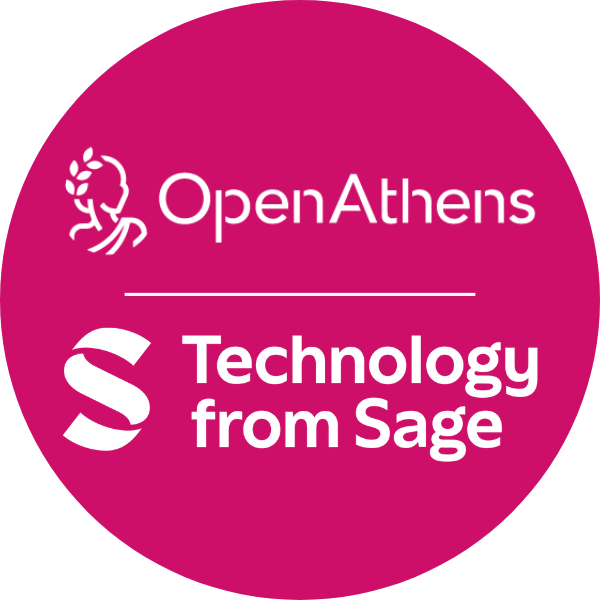
In September we were excited to collaborate with OpenAthens on a webinar titled: Striving for a painless route to online content: Reimagining the academic library for the student of tomorrow. We explored how researchers can do their best work when they’re unable to get online, and how academic libraries can meet the evolving needs of students in the 21st century.
The webinar was presented by: Richard French, Product Manager at OpenAthens, Matthew Weldon, Library Patron Consultant at Technology from Sage, Ian Snowley, Dean of Learning Skills and University Librarian at University of Lincoln, and Maizie and Madeline, two second year students from University of Lincoln.
The webinar also explored the findings of two key reports, both published earlier this year:
We’re delighted to present 7 ways to reimagine the academic library based on Matthew’s discussion with Ian, Maizie and Madeline. Here are the ways the academic library can be more involved with the student learning journey:
The Librarian Futures Part II report found that that students receive support from “myself”, “my peers”, and “my teachers” more than librarians. This is a key issue which a lot of academic librarians are aware of, especially as they put huge amounts of effort into trying to communicate with students.
We feel it’s really important to try and integrate our support as much as possible ….It’s very clear that academics are in a key position to influence students, much more so than other staff in the university.”
Ian Snowley
Madeline highlighted that she found it incredibly useful to participate in library training sessions at the beginning of the academic year which provided guidance on using the library resources. Maizie noted that they had library led sessions where they actually went to the library and were taught how to use it, and this support was incredibly helpful.
There was a big push for us to sort of do our work in the library and at least for the first few weeks of university just to come and sort of see how the library works.”
Madeline
Maizie said the type of support from the library which has been the most useful has been referencing help, especially when she first started at university. Ian added that getting students to understand referencing and to do it right is a relatively solvable problem, but selecting reference management software is quite a personal decision amongst students. However, the library can support with signposting students towards the different reference management options.
Obviously referencing is such a new concept and I know myself and some of my friends have gone to the library and they’ve gave us guides which tells us exactly how to do it … but that’s where I found it most helpful.”
Maizie
Madeline said that she was grateful University of Lincoln offers a lot of skills seminars, especially academic reading which is really is something she has to focus on more with studying an essay-based subject with a dissertation. Maizie agreed with Madeline that academic reading is a skill which does take a lot of time to hone and perfect and analysing is probably the hardest part of reading.
I think that’s definitely something we’re very grateful that the library offers because I think all of our seminar tutors would get very sick of us asking all the time how to do it properly.”
Madeline
Both Madeline and Maizie acknowledged that they feel students may not instantly make the connection between librarians being that academic support, as their lecturers are normally their first port of call for academic issues.
The lecturers really promote their office hours and they host drop in sessions so that support seems more readily available whereas you have to seek it out yourself in the library, which might seem quite daunting to a lot of students.”
Maizie
I think it is just sort of more at the front of our minds to go to [seminar tutors] rather than to go to our subject librarian, which, obviously, as you were all saying, is a shame, because subject librarians do have a lot of knowledge that they can offer.”
Madeline
Ian described the work University of Lincoln have done to further integrate what the library does into the academic process of reading for students’ degrees.
We think it will take some time, but it just allows us to really work more closely with academics. And as Maizie and Madeline pointed out, we can, as librarians, deliver some key learning objects that students will benefit from and that aren’t necessarily part of the subject discipline.”
Ian
Ian said that effective library support needs to fit all the different types of students that attend University of Lincoln, from full-time students to those participating in apprenticeships. The library should help students get through the many pressures they face.
Our students, I suspect, are as pressured as any students have been before, with all the sort of implications of the economy and the kind of cost-of-living crisis. So, we need to be there for them, delivering what they need when they need it.”
Ian
Finally, Madeline noted that an effective library just needs to support students when they need the support and be a resource that all students can use, whether that’s supporting with essay writing or academic reading or how to read statistics properly.
I think a library that is accessible and also approachable is just so useful. If a student feels at ease and willing to utilise all the services and resources librarians offer, then it’ll just be even more beneficial.”
Maizie
Recent reports highlight the struggles faced by students and researchers in finding and accessing valuable resources. Strategies for librarians include establishing connections with academic staff and participating in the university’s teaching and learning strategy. However, by improving the discovery process, centralizing information, and showcasing the expertise of librarians, we can navigate this online research maze with ease. Let’s work together to bridge the gap between students, researchers, and libraries and create a seamless path to knowledge in the digital age.
Download our Librarian Futures Part II report to discover more noteworthy insights regarding how academic libraries can be more deeply involved in the undergraduate learning journey.
Lean Library Case Study: Kennesaw State University August 31, 2023
In this case study, we look at how Kennesaw State University Library used Lean Library to increase patron usage of its digital collections.

Lean Library has been instrumental in helping students and faculty become aware of the breadth of resources they can access through our subscriptions, particularly those provided through academic publishers.
Karen Doster-Greenleaf, Director of Research & Instructional Services/Librarian Associate Professor
Kennesaw State University librarians tried on multiple occasions to promote their digital collection offering through social media outlets without much success due to a lack of awareness of their digital collection holdings and how to access this content by students and faculty. This led the team to research and find a solution that simplified the search process and saved access and research time for faculty and students.
We analyzed our digital collection data and found only a 24% usage level from November 2021 to November 2022… We asked ourselves how we could maximize the exposure of our resources and increase usage.
Li Chen and Karen Doster-Greenleaf, Kennesaw State University (KSU)
Kennesaw State University introduced Lean Library Access in July 2022, promoting the tool through a mixture of passive and active promotion, including website banners, campus announcements and FAQs on how to use Lean Library.
Since we adopted Lean Library, we have received positive feedback from both faculty and students. The usage of our library collection through Lean Library has steadily increased as well.
Li Chen and Karen Doster- Greenleaf, Kennesaw State University (KSU)
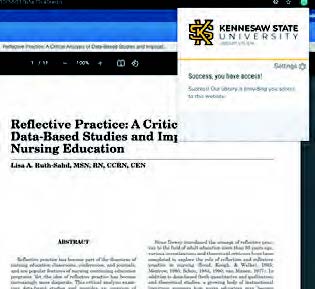
When patrons accessed a website Kennesaw State University is subscribed to, they would receive a pop-up assist message

To promote the availability of Lean Library to patrons, promotional collateral was created and shared throughout the campus
The introduction of Lean Library created a sharp increase in the number of library resources accessed, growing from 88 to 3,355 (3712%) in just 4 months.

The number of Link Resolver requests also increased after the introduction of Lean Library.
If you’d like to hear more or receive a product demo, get in touch.
Lean Library launches redesigned extension on major web stores August 22, 2023We’re thrilled to announce that Lean Library, a Technology from Sage product, is launching a redesigned and improved browser extension on all major stores. This is the same access broker and workflow tool loved by librarians and their patrons – only quicker, sleeker, and better than before.
Lean Library puts your library on your patrons’ shoulder via one easy-to-use extension on their browser. Lean Library simplifies online access to library content and open access alternatives, and embeds library collections and services into the patrons’ workflow – whether they start on Google Scholar, PubMed or beyond.
The improved extension first launched on the Google Chrome store in June, and is being made available on Microsoft Edge, Opera and Mozilla Firefox stores this August-September. The final web store it will be made available on is Safari later this year. The extension automatically updates for users of Lean Library, along with their regular app updates, so existing users don’t need to download anything new to get the new experience.
Founded in late 2016, Lean Library provides an award-winning library service, bringing library resources and support directly into the patron’s workflow. This redesign marks a significant milestone in our journey to facilitate seamless learning and research workflows. It is the culmination of an extensive period of development, driven by invaluable feedback from librarians, students, and researchers.
There were three main goals for the redesign:
Our new UI design is sleek, modern, and thoughtfully crafted to emphasize content and minimize distractions. This will allow library patrons to focus on what truly matters – accessing your library-licensed content as soon as they need it.
Time is precious for students and researchers, and we want to make their tasks effortless. We have carefully restructured the navigation in one side tray, bringing together multiple notifications and features across all subscription packages. With just a few clicks, users can effortlessly customize preferences and discover new tools and content that enriches your library’s digital presence.

The redesign delivers significant performance and speed enhancements. We’ve fine-tuned the inner workings of the extension, optimizing it to provide libraries and their patrons with a swifter browsing experience. Say goodbye to longer pop-up loading times and hello to instant access to patrons’ favorite library resources.
Whether patrons are searching for scholarly articles, exploring databases, or accessing e-books, they’ll experience accelerated browsing with the new Lean Library extension!
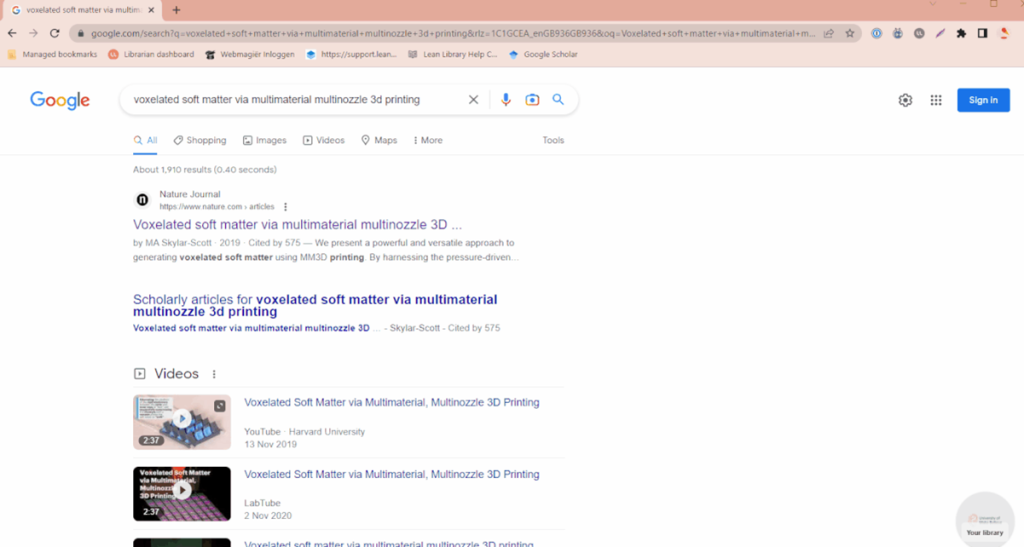
‘Keyword Enhancements’ is a functionality of the Lean Library Futures package that highlights library-licensed publisher or special collections content to users in their workflow. One optimization within the new extension is the ‘Always On’ feature for Keyword Enhancements. Relevant taxonomy terms will now appear automatically to your users on sites such as Google and Wikipedia.
If users did want to turn off one or all packages, however, they can do so easily by using the toggles or the ‘enable/disable’ button.
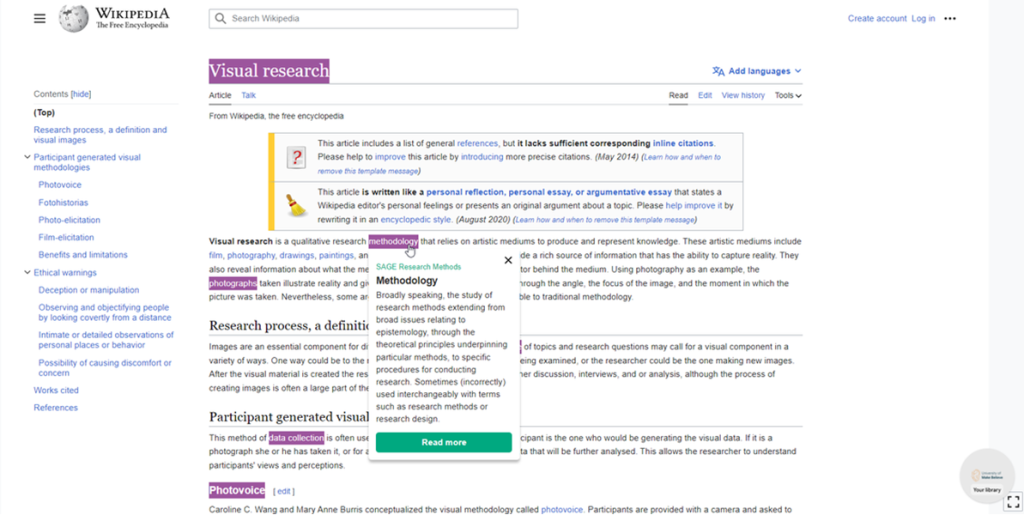
The best way to get to know the new Lean Library experience is by getting a demo from one of our experts. Request a demo today.
What are the risks and opportunities for AI in the academic landscape? July 25, 2023

We recently held our inaugural Tech from Sage Insight conference, a two-day event held in Birmingham, bringing together Technology from Sage staff, academic librarians, students and thought leaders from across the higher education sector. At the event, members from Technology from Sage’s Tech Team hosted a ChatGPT and Generative AI Co-design Challenge: How can we address the risks and benefit from the opportunities? breakout session with librarians. As technology continues to advance, artificial intelligence (AI) is making its way into various aspects of our lives, including the field of education.
Benjamin, Nadeem, Richard and Alex from Technology from Sage’s Tech Team have shared the discoveries from the workshop in this blog post. They’ll explore the effects of AI on assignments and assessments in educational settings; from AI-powered answer generation and checking to the digitization of resources and examine the advantages and challenges that arise from integrating AI into the learning process.
AI has the potential to revolutionize the way students answer questions. With AI algorithms, students can receive immediate assistance in formulating well-structured and accurate responses. AI can analyze the question, identify relevant keywords, and suggest appropriate answers, providing a valuable resource for students to enhance their learning experience.
Additionally, AI-powered tools, similar to Grammarly, can assist in checking the accuracy and clarity of students’ answers. These tools can help students identify grammatical errors, enhance their writing style, and improve overall academic performance.
One challenge with integrating AI into education is the dated nature of training materials. As AI relies on vast amounts of data, outdated training materials can lead to inaccurate or fictional references. Educational institutions need to ensure that the data used to train AI models is up-to-date and relevant to avoid misleading students.
Another area where AI can be beneficial is link validation in reading lists. Currently, identifying broken or outdated links is a manual and time-consuming process for librarians. AI-powered algorithms can automate this task, making it easier to ensure that students have access to reliable and up-to-date resources. Additionally, AI can assist in automating purchasing needs, enabling institutions to make cost-effective decisions by comparing prices and suppliers.

AI can play a significant role in improving content discovery for students. By analyzing user preferences, reading histories, and academic requirements, AI algorithms can provide personalized and accurate recommendations for further reading. Similar to Netflix’s recommendation system, AI can suggest relevant resources that align with a student’s interests and academic goals.
Furthermore, AI can help address the issue of bias in resource collections. By considering a broader range of factors beyond just keywords, AI algorithms can provide more diverse and unbiased content recommendations. Cross-institution and cross-department recommendations can also facilitate interdisciplinary learning and collaboration.
The digitization of resources brings accessibility benefits to students. AI can assist in formatting resources to meet accessibility standards, such as providing image alt text for visually impaired students. However, challenges arise in accurately converting scanned chapters to digital format, especially with complex elements like tables and graphs. Librarians may face difficulties in identifying issues with Optical Character Recognition (OCR) and ensuring the quality and usefulness of digitized content.

Live chat and chatbot services have become popular ways for students to seek assistance. AI-powered chatbots can handle frequently asked questions, reducing the workload of librarians and providing immediate responses to students’ queries. However, there may be a lack of trust or enjoyment in using chatbots, highlighting the importance of improving their training and performance.
The COVID-19 pandemic has further accelerated the adoption of chat services, with some institutions implementing 24/7 support from American universities. There is also potential in training AI models on librarian knowledge bases to provide more accurate and tailored responses to student inquiries.
Educational institutions need to adapt assessments to account for the influence of AI and prevent academic dishonesty. While plagiarism has always been a concern, the use of AI raises questions about the reliability and fairness of traditional assessment methods. Assessments should aim to test understanding in ways that AI cannot currently replicate.
Some interesting remarks were made on a more global approach to AI from educational institutions; while some are resistant to it, and the avenues it opens up to students in the form of plagiarism, AI will be an everyday tool employed in the job market by the time they graduate/enter the workplace. By depriving students of these tools in academia, are institutions restricting the skillsets of individuals further down the line?
Just as when search engines became mainstream, and created concerns over plagiarism and how these tools will be used within the context of education, AI provides both concerns and opportunities.”
ALEX, SENIOR PHP ENGINEER
Click below to access all of the Tech from Sage Insight 2023 recordings:
Librarian Futures: In Conversation with Patrons July 10, 2023
We recently held our inaugural Tech from Sage Insight conference, a two-day event held in Birmingham, bringing together Technology from Sage staff, academic librarians, students and thought leaders from across the higher education sector.
At the event, EdTech Success Consultant, Matthew Weldon, spoke with Samantha Sharman (student at the University of Lincoln) and Professor Jamie Wood (University of Lincoln) about the key takeaways from part two of our Librarian Futures series of reports. We’ve summarized some of the main points from this thought-provoking session below, as well as provided audio excerpts from our speakers.
Check out the recording from our session at Tech from Sage Insight below:
Our research shows that most students are using Google while during their research, and a plurality go to Google first. Our panelists were not surprised by this, and agreed that academic libraries have a crucial role to play in addressing this. Libraries can empower students by training them to use Google effectively, ensuring that students are equipped to navigate through the vast sea of information and access credible sources.
We also found that students do not identify librarians as having helped them across a number of categories, including reading academic literature. Jamie Wood described how signposting, integrating library resources into modules, and modelling the value of the library might contribute to a better understanding of the role and value of the library among students. Samantha Sharman then described how big a difference being taught by a librarian has made to her studies.
We asked whether, as technology continues to evolve, libraries should be involved in addressing emerging tools like ChatGPT. Our panelists discussed how educating students on how to use such technologies effectively and ethically is essential to promote responsible academic practices, and how by providing guidance on the appropriate use of ChatGPT and fostering discussions on the topic, libraries can help students navigate the ethical challenges inherent in using these technologies.
In our session, we discussed at length the pivotal role that libraries have in supporting students and academics, especially in the digital age. However, as our Librarian Futures series highlights, to provide the appropriate support to students means that librarians must address the bidirectional knowledge gap that exists between librarians and their patrons. We’re grateful to Samantha Sharman and Professor Jamie Wood for joining us at our Insight event to discuss their thoughts on the knowledge gap and the future of the academic library, and we’re excited to continue to work with and support librarians and library patrons.
Click below to access all of the Tech from Sage Insight 2023 recordings:
A Day in the Life, with our Customer Success Consultant, Julia Dougherty July 6, 2023
At Technology from Sage our purpose is to support libraries in advancing teaching, learning and research. We can’t achieve this mission without the work of the talented team at Technology from Sage, so we’ve launched a series of posts for you to find out more about the team.
In this A Day in the Life post, we’re joined by our new Customer Success Consultant, Julia Dougherty at Technology from Sage. Read on to find out more about Julia – including what it’s like starting a new role remotely, her librarian background and love of thrifting!

Hi everyone! I am the newest Customer Success Consultant on the Technology from Sage team based in Houston, Texas.
Right now I’m onboarding, but I’m looking forward to working with and supporting current Technology from Sage clients daily via support, regular calls, and catch-ups.
I’m most excited to combine my librarian experience with my sales and customer support experience in this role. I look forward to speaking to people in the academic library space every day!
I am pretty new to Technology from Sage, so that’s yet to be seen! I can definitely say I appreciate the open communication channels we have between teams.
I am directly involved with the Operations team. Although it can be complicated to connect as a team that all live in different countries from yourself, it seems there are regular efforts to chat and catch up.
It can be a bit daunting to start a role on the other side of the Atlantic from the rest of your team and in different time zones from yourself. However, I enjoy getting to know people from around the world, and my team has been very supportive thus far.
I’m a lover of music and have played piano for over 10 years. I also love traveling, dogs, and thrifting.
If you have any questions, feel free to email me at Julia.dougherty@technologyfromsage.com. Cheers!